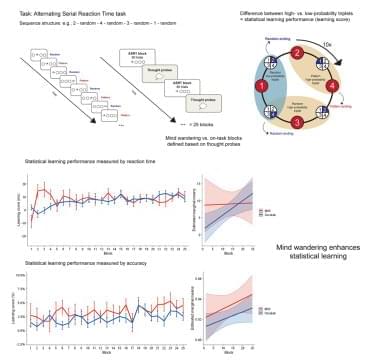The human brain spends 30–50% of its waking hours engaged in mind-wandering (MW), a common phenomenon in which individuals either spontaneously or deliberately shift their attention away from external tasks to task-unrelated internal thoughts. Despite the significant amount of time dedicated to MW, its underlying reasons remain unexplained. Our pre-registered study investigates the potential adaptive aspects of MW, particularly its role in predictive processes measured by statistical learning. We simultaneously assessed visuomotor task performance as well as the capability to extract probabilistic information from the environment while assessing task focus (on-task vs. MW). We found that MW was associated with enhanced extraction of hidden, but predictable patterns.
